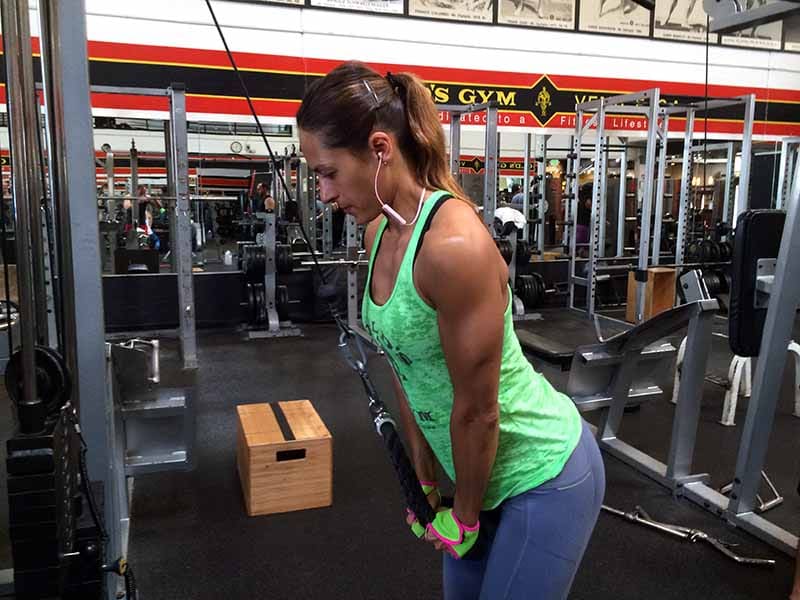In case you repeatedly do cardio (like operating, swimming, dancing, and so on.), you’ve most likely observed that your blood sugar reacts otherwise relying on the kind of cardio.
Whereas steady-state cardio will often make your blood sugar drop, interval coaching could make it enhance (you’ll be able to learn why on this submit).
The identical goes for resistance coaching (weight lifting) and blood sugar. Some forms of resistance coaching will make your blood sugars enhance!
On this submit, I’ll discuss how several types of resistance coaching impacts your blood sugar and the methods you’ll be able to attempt to proactively handle your blood sugar throughout and after resistance coaching.

Why resistance coaching is nice for individuals with diabetes
I completely love resistance coaching for 3 easy causes:
- Resistance coaching makes me really feel sturdy and empowered.
- Resistance coaching has helped me form my physique to my liking.
- Resistance coaching finally makes my diabetes simpler to handle, because it improves my physique’s capability to make the most of insulin.
Resistance coaching typically falls into two classes
- Low-rep (heavy) coaching with pauses between every set.
- Excessive-rep coaching or supersets with little relaxation between units. Your coronary heart charge is elevated all through the exercise.
Every kind of resistance coaching will have an effect on my blood sugar a bit otherwise throughout my exercises however they each have the identical long-term advantage of a considerably improved insulin sensitivity.
How high-rep resistance exercises have an effect on my blood sugar
Normally, I must be a bit extra cautious and watch my sugars extra intently if I do excessive rep exercises, supersets, or a variety of compound leg workout routines (like squats, deadlifts, or lunges).
These sorts of exercises can have a cardio-like (cardio) influence on my blood sugar since my coronary heart charge will probably be elevated for many of the session and I can anticipate my blood sugars to drop.
I deal with classes like these nearly as I’d deal with steady-state cardio – by decreasing my pre-workout bolus by about 30%-50%.
How low-rep resistance exercises have an effect on my blood sugar
In terms of extra conventional resistance coaching with fewer reps (lower than about 12 reps per set), the state of affairs is a bit totally different. When doing exercises like this, I typically see my blood sugar go up, and typically I don’t see a lot of an influence in any respect. It principally comes right down to what physique half I’m coaching.
For smaller muscle teams like arms and shoulders, my coronary heart charge received’t often enhance that a lot regardless of the heavy weights and my blood sugar will stay secure. If I do heavy chest, again, or leg exercises, nevertheless, I’ll more than likely see an influence on my blood sugar, and it could usually be a rise. My physique reacts in the identical manner as after I do an interval cardio exercise.
Given this data, I’ll scale back my pre-workout bolus minimally or in no way for a low-rep exercise, relying on the physique elements I’m coaching.

How one can put together for resistance coaching and forestall post-workout lows
In terms of resistance coaching, pre-workout meals play an enormous function in whether or not you’ll achieve success within the gymnasium. I at all times eat one thing earlier than and after a strength-training exercise to verify I’ve sufficient vitality to do the exercise, to rebuild my muscle mass, and to keep up good blood sugar ranges.
My pre-workout snack is a reasonably low glycemic carb (like brown rice) and a few lean protein (like hen breast) which I eat about an hour earlier than my exercise. By consuming a low glycemic carb plus some protein, I get sufficient vitality for my exercise with out having to take a variety of insulin.
My post-workout snack consists of a low or excessive glycemic carb with an simply digested protein (like fruit and a whey protein shake).
As talked about, I typically scale back my insulin bolus quantity for the pre- and post-workout meals by as much as 50%, particularly on high-rep and superset days, as a result of cardiovascular (cardio) element of the exercise, which at all times makes my blood sugar drop. Nevertheless, taking a little bit of insulin earlier than a resistance coaching exercise additionally has the profit that it reduces my threat of excessive blood sugar throughout the low-rep classes.
How one can alter your insulin as much as 36 hours after a resistance exercise
My method to insulin changes for the 24 to 36 hours after I depart the gymnasium is identical it doesn’t matter what type of resistance coaching I’ve finished.
What occurs once you do resistance coaching is that you simply create microscopic tears in your muscle fibers, and for the following 24 to 36 hours, your muscle mass heal and get larger and stronger. Throughout this era, your muscle mass want vitality in an effort to heal and that has to return from someplace, so low blood sugars can simply be the end result if I don’t plan forward.
If I do resistance coaching lower than 4 occasions per week, I’ll usually have to scale back my nighttime basal insulin by as much as 50% on the times on which I work out (that is totally different for each particular person so you have to experiment and observe your outcomes to search out what works finest for you).
If I do resistance coaching greater than 4 occasions per week, the elevated insulin sensitivity is current on a regular basis and I can merely decrease my nighttime basal completely with out having to regulate for particular person exercises.
Abstract
I discover it simpler to regulate for resistance coaching than for cardio, so long as I’m very conscious of the type of resistance coaching I’m doing and bear in mind these pointers:
- Excessive-rep exercises wherein your coronary heart charge is elevated will more than likely make your blood sugar drop.
- Low-rep exercises that don’t elevate your coronary heart charge considerably (like arms or shoulders) more than likely received’t have an effect on your blood sugar.
- Arduous low-rep exercises of huge muscle teams can have an effect on your blood sugar like an interval exercise, doubtlessly resulting in a rise in blood sugar.
- Don’t be afraid of consuming!!! Eat sufficient lean protein and carbs to gas your exercise, guarantee muscle restoration, and (with the suitable insulin dose) stabilize your blood sugar ranges.
- Think about decreasing your insulin ranges appropriately throughout the 24 to 36 hours after a exercise to regulate for the kind of resistance coaching you’ve finished.
Have enjoyable within the gymnasium!
Prompt subsequent posts:
In case you discovered this information to diabetes and resistance coaching helpful, please join our e-newsletter (and get a free chapter from the Match With Diabetes eBook) utilizing the shape beneath. We ship out a weekly e-newsletter with the newest posts and recipes from Diabetes Sturdy.